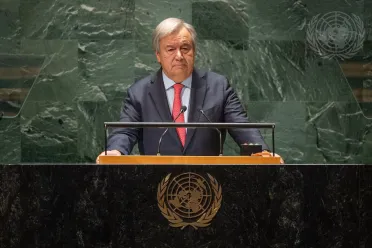Statement
Statement summary
ANTÓNIO GUTERRES, Secretary-General of the United Nations, warned that the world is becoming unhinged. “Geopolitical tensions are rising,” he emphasized, also adding: “And we seem incapable of coming together to respond.” While the world has changed, institutions have not. “We cannot effectively address problems as they are if institutions don’t reflect the world as it is,” he added. The world is inching “ever closer to a great fracture” in economic and financial systems and trade relations; one that threatens a single, open Internet; with diverging strategies on technology and artificial intelligence; and potentially clashing security frameworks, he warned, further emphasizing the need to adapt and reform. That means reforming the Security Council and redesigning the international financial architecture so that it becomes truly universal and serves as a global safety net for developing countries in trouble. “It’s reform or rupture,” he said. The world needs statesmanship, not gamesmanship and gridlock.
“It is time for a global compromise,” the Secretary-General continued, also adding: “Politics is compromise. Diplomacy is compromise. Effective leadership is compromise.” What is needed is determination to end the scourge of war and uphold respect for international law. The Russian Federation’s invasion of Ukraine is in violation of the Charter of the United Nations and international law. It has unleashed a nexus of horror: lives destroyed, human rights abused, families torn apart and children traumatized. “Nuclear threats put us all at risk,” he warned. The world must not relent in working for peace — a just peace in line with the Charter. Even while fighting rages, the world must pursue every avenue to ease the suffering of civilians in Ukraine and beyond. The Black Sea Initiative was one such avenue. The world needs Ukrainian food and Russian Federation food and fertilizers to guarantee food security. “I will not give up on my efforts to make it happen,” he pledged.
“Around the globe, old tensions fester while new risks emerge,” he continued. Nuclear disarmament is at a standstill while countries develop new weapons and make new threats. Across the Sahel, a series of coups is further destabilizing the region as terrorism is gaining ground. Sudan is descending into full-scale civil war. In eastern Democratic Republic of the Congo, millions are displaced and gender-based violence is a horrific reality. Haiti is overwhelmed by gang violence. In Afghanistan, a staggering 70 per cent of the population needs humanitarian assistance with the rights of women and girls systematically denied, he said. In Myanmar, brutal violence is crushing hopes for a return to democracy. In the Middle East, unilateral actions are undermining the possibility of a two-State solution — the only pathway to lasting peace and security for Palestinians and Israelis. Syria remains in ruins while peace remains remote.
The global humanitarian system is on the verge of collapse, he warned, urging all countries to fund the Global Humanitarian Appeal. Today, countries are forced to choose between serving their people or servicing their debt. Africa spends more on debt interest than on health care. The world together can take determined steps to help countries weather crises such as the COVID-19 pandemic. That includes urgently advancing the Sustainable Development Goals Stimulus of $500 billion per year. Turning to climate change, he said, there is still time to keep rising temperatures within the 1.5°C limits of the Paris Agreement on climate change. Group of 20 countries, responsible for 80 per cent of greenhouse-gas emissions, must “break their addiction” to fossil fuels, he stressed. The world must phase out coal, oil and gas in a fair way and massively boost renewables. Developed countries must reach net zero as close as possible to 2040, and emerging economies as close as possible to 2050.
Around the globe, women’s rights — including sexual and reproductive rights — are being suppressed and even rolled back, and women’s freedoms curtailed, the Secretary-General went on to say. Gender equality is not the problem. Gender equality is the solution. Human rights — political, civil, economic, social and cultural — are the key to solving many of the world’s interlinked problems. Turning to generative artificial intelligence, he said such technology holds much promise — but “it may also lead us across a rubicon and into more danger than we can control”. New technology requires new and innovative forms of governance. He urged the need for a Global Digital Compact — between Governments, regional organizations, the private sector and civil society — to mitigate the risks of digital technology and identify ways to harness their benefits for the good of humanity.
Only determination and compromise can rescue a world that is becoming “unhinged” Secretary-General António Guterres said on Tuesday, delivering a stark message to leaders gathered in New York: reform the multilateral system and come together for the common good.
Full statement
Read the full statement, in PDF format.
Photo

Previous sessions
Access the statements from previous sessions.
